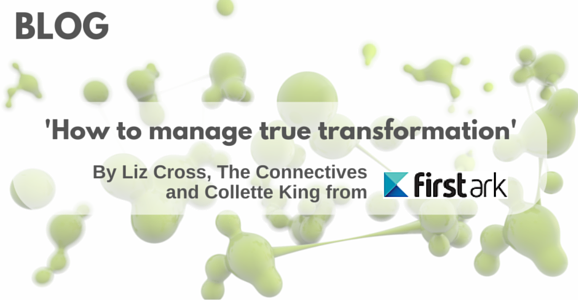FINANCIAL SERVICES CASE STUDY:
Culture change helped collapsed bank return to private sector
Following its collapse, a high profile financial services business, with a UK based head office and network of outlets, required a consultancy that could help it make a smooth transition back into the private sector by growing its leadership capabilities and commerciality.
Having already worked with The Connectives, executives at the bank were aware of the team’s collective expertise and experience, and both trusted and valued its approach. For these reasons The Connectives was given the opportunity to tender against a number of other consultancies for the work, which it won in 2010.
The Connectives managing director, Liz Cross, led a team of eight consultants and coaches that worked on the 18 month project alongside the bank’s directors -ExCo, head of human resources and organisational development, learning and development team, and senior and middle leaders.
The objective was to undertake a thorough diagnostic, make recommendations and build interventions that would enable the bank to develop a culture of commerciality and accountability. At the core of this work lay the belief that a new and shared culture was needed and that mindsets and behaviours needed to change in order to help it ‘heal’ and get ready for a return to the private sector.
During the diagnostic phase, The Connectives designed and facilitated focus groups and undertook one-to-one interviews with every executive director and over 60 employees. The team also engaged with people at all levels to find the most effective solutions to changing culture and building the bank’s leadership capability and capacity.
The Connectives carried out data analysis using a well-tested behavioural change model to develop 20 optional interventions that could deliver the desired change and interviews with executive members, who selected the top 10 preferred intervention options. The team also supported L&D experts to deliver elements of the agenda and maximise the benefits of existing processes and training. Cornerstones of the initiative, designed and delivered by the Connectives, included a two day intensive leadership intelligence event developing people and solving business challenges; 360˚ degree feedback executive coaching activity and work on developing communication skills.
Commenting on the project, Liz Cross, the managing director of The Connectives said: “We designed a programme which focussed on delivering increased ‘accountability and commerciality’ and felt very encouraged to get real buy in for the proposed solutions. Our aim was for everyone at the bank to have a real sense of a common culture and it was fantastic to see significant changes in this area, as well as improved leadership impact. Specific coaching goals were achieved and we were given direct feedback about the positive outcomes and impacts on the bank.”
Allison Thompson, director of HR and OD at the bank during this time said: “Following the collapse of the bank we asked The Connectives to identify how we could increase accountability and unlock our intelligence to deliver a major turnaround, in the face of public and government scrutiny, in order to return the bank to the private sector.
“The team worked with us over an 18 month period, creating a great rapport and trust and offering valuable insights and solutions that made a tangible difference. Over 60 leaders started working to their strengths, mindful of the impact of motives, personality, team dynamics, trust and influencing. The L&D team developed an ability to work with tools and techniques for future in-house delivery and to top it all off we won the Excellence in Developing People Award at the CIPD Awards in 2012, which was an amazing feat for a business that had only a few years earlier experienced such turmoil.
“The ability to engage such a huge amount of people in a short space of time is testament to The Connectives’ experience. Liz and her team worked alongside our leaders and employees, with real impact, to bring about a positive culture change that benefited both staff and customers alike.”

